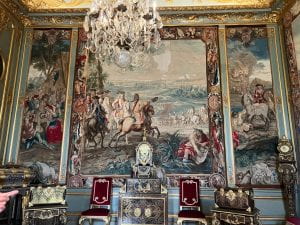Blenheim Palace is home of the Dukes of Marlborough. It is also the birthplace of Winston Churchill. The palace is known for its riches which come in the form of intricately decorated gold ceilings, a library long enough to host dinner guests, and numerous gardens one can easily get lost in. Each piece of furniture is yet another opportunity to display wealth, from the finest of porcelain decor to the intricate tables and chairs. The side tables that weren’t walled off as a part of the display that could easily be mistaken for something a tourist could lean back on while listening to their tour guide talking were marked with signs saying, “do not touch.” And in each of the rooms, there were paintings of John Churchill, his family, and is descendants. There were also many depictions of John Churchill gloriously riding his horse into battle with his red coat on to defend the crown. One of which was a tapestry made of finely woven wool and silk that was positioned in the corner of two walls, taking up most of the space there. It’s known as one of the largest tapestries in the U.K.
However, the story of how the Dukes of Marlborough managed to accumulate so much wealth is less glorious than many, including the tour guide, would probably like to acknowledge. Blenheim Palace is seen as an idyllic country home, a place where people feel a sense of national pride and a sense of comfort. Perhaps this makes it even more of a reason to reflect on why that is so and go deeper in unpacking the history of these idyllic country homes.
Many of these idyllic country homes have some connection to the former slave economy from the 18th and 19th century. These sites and the wealth are intertwined with Britain’s colonial history even if it is unspoken. While some see these sites as a place of veneration of a gently ordered past, for others these sites are a display of power.
India was known as the crown jewel of the British Empire. Knight explains that “In 1884, the British state had a total income of two hundred and three million pounds, of which more than half came from its overseas territories, including seventy-four million pounds from India.” That is about 35% of Britain’s income in 1884. The colonization of India was often framed as this great empire that Britain was able to conquer, a kind of cultural achievement. Its riches were taken as trophies of that conquest. This time period of imperialism is often seen through the eyes of rose toned nostalgia without the acknowledgement of the people who suffered so that a few individuals could profit. The riches are seen and admired while the suffering is quietly tucked away. It is estimated that up to one in six manors were bought and funded from the wealth that came from imperialism.
The erasure of the colonial legacy was the most piercing to me when my tour guide got to the subject of Winston Churchill. The guide talked at length about Churchill with great detail about his life and education. However, the main detail that was conveniently left out was that Churchill was an ardent imperialist. It is not surprising considering his wealthy upbringing and how the riches he grew up around were the product of imperialism, a product that was framed by a sense of glory. I found my self taking a moment to examine each of his portraits while the rest of my tour group hurried along to the next exhibition. And all I could think of was his impact on the Bengali famine of 1943 where three million people died because he did not see the Bengali people as fully human.
There is a sense of melancholy that stayed with me during my visit in Blenheim Palace. I was surrounded by beauty but I carried with me context of imperialism. Rather than the palace striking a whimsical imagination of dukes and royalty, I felt a sense of somberness. And while the palace tried to be frugal by opting for 8 carat gold on the ceilings instead of 24 carat gold, the empire did not try to be frugal in the number of victims. And while the sun did eventually set on the British empire, the legacy is still golden and blinding to the point of historical amnesia


